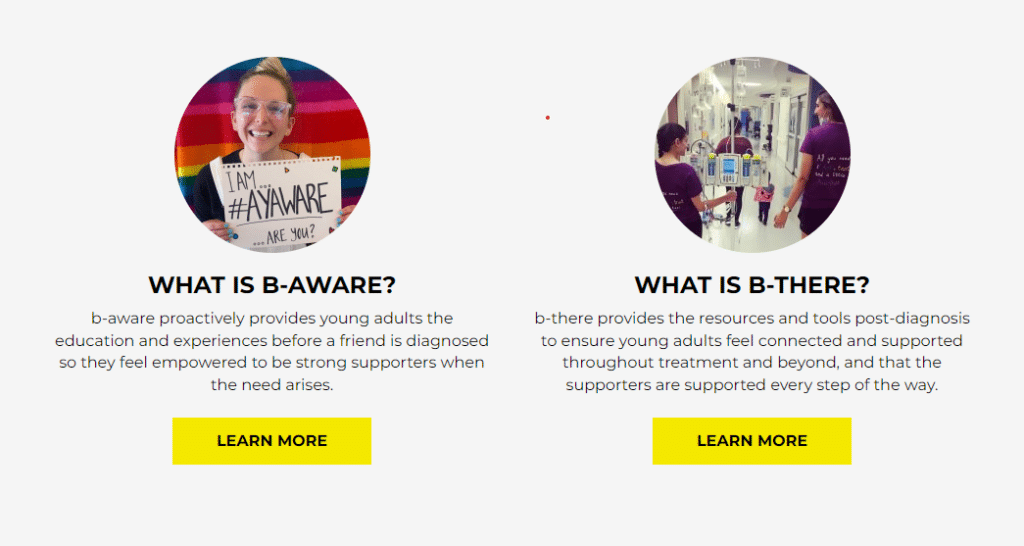We know how crucial it is to b-there and support young adults with cancer in meaningful ways. One significant way to show support to your loved ones going through this time is through food—nourishing meals can provide comfort and strength during a difficult time. However, certain foods can interfere with cancer treatments or exacerbate side effects. The first step is to ask about their specific likes, dislikes, and food allergies. Educate yourself as much as possible on their dos and don’ts so you know what to avoid.
These needs will evolve as treatments and tastes change, so be sure you are up to date. If a nutritionist is assigned to their care team, they can also be a great source of helpful guidelines and should be your resident expert if there are questions. Also, be sure to seek information from authoritative sources like the NIH and the American Cancer Society.
Here’s a guide on what to consider so you can prepare meals that will be both safe and comforting for your loved one undergoing cancer treatment.
Raw or Undercooked Foods
Cancer treatments like chemotherapy and radiation can weaken the immune system, making patients more susceptible to infections. To minimize the risk of infection, avoid raw seafood (like sushi and sashimi). Steer clear of undercooked meat, poultry, and eggs. Choose pasteurized dairy products over unpasteurized ones.
Spicy and Highly Seasoned Foods
Mouth sores and gastrointestinal discomfort are common side effects of some treatments. Spicy foods can worsen these issues, so it’s best to skip hot peppers and chili powder. Avoid curry and other spicy sauces, and limit heavily seasoned dishes as well.
High-Fiber Foods
High-fiber foods are essential for a healthy diet, however, they may cause bloating, gas, and diarrhea during some treatments. To prevent discomfort, be sure to check in with your loved one first. Limiting raw vegetables, choosing refined grains over whole grains, and reducing intake of legumes and beans are all possible ways to mitigate these side effects.
Greasy and Fatty Foods
Greasy and fatty foods may be tough to digest and increase nausea or vomiting. To keep meals light and easy on the stomach, avoid fried foods, skip fast food, and opt for lighter sauces over heavy, creamy ones.
Sugary Foods
Excessive sugar can lead to things like weight gain and blood sugar spikes, so try to keep things balanced and remember moderation is key. A favorite dessert once in a while can be a nice treat, so don’t deprive them of their minimal candy and desserts. Limit sugary beverages and avoid processed food and/or snacks.
Alcohol
Alcohol can interfere with medications and worsen side effects. Keep this in mind when offering beverages as well as alcohol-based sauces and desserts.
Acidic Foods
Acidic foods can irritate the digestive system, especially if there are mouth sores or gastrointestinal issues. Examples of acidic foods include citrus fruits like oranges, lemons, and grapefruits, as well as tomato-based products and vinegar-heavy dishes.
Caffeine
Caffeine can lead to dehydration and exacerbate anxiety and sleep issues. It can be found in a variety of beverages and foods. In addition to the obvious beverages like coffee, tea, and energy drinks, it is found in certain sodas, chocolate, and coffee-flavored desserts. To keep your loved one comfortable try to limit these, and avoid them before bedtime.
Tips for Supportive Meal Preparation
- Opt for gentle cooking methods – steaming, baking, or poaching can make food easier to digest.
- Focus on balanced, mild flavors and use herbs such as basil, parsley, and thyme instead of strong spices.
- Hydration is key, so ensure there are plenty of fluids, such as water and broth in the dishes you’re cooking for your loved one.
- Protein is a powerful and important source while undergoing treatment, try to include easily digestible proteins like chicken, fish, tofu, and eggs.
- Soft and soothing foods like mashed potatoes, oatmeal, and smoothies can be comforting and easy to eat.
b-there. It really is that simple.
Staying connected and receiving consistent and meaningful support is a cancer survivor’s lifeline. The b-there app was designed specifically for busy young adults, balancing life and being supportive friends. Survivors can easily share their status, desire to connect, manage activities, and request needed items. Supporters can check the app for updates on how their loved one feels before connecting or stopping by, and they can sign up to fulfill items from their wish list. Being there and staying connected has never been easier! The app is free and available to download now on iOS and Android.
Bringing a meal to a loved one undergoing cancer treatment is a great way to show intention with your support. By being mindful of their likes, dislikes, and things to avoid, you can help them feel more comfortable and cared for at such a pivotal time in their lives. Remember, the best meals are those prepared with love and attention to their unique needs during this challenging time.
By following these guidelines, you’ll be able to provide meals that not only nourish but also bring comfort and support to your loved one during cancer. For more tips and resources, visit b-present.org/b-there.
Want more tips on being a supporter:
- Read Social Life Interrupted: Staying Connected with Friends During Cancer
- Read Navigating Support Roles and Responsibilities: A Guide for Romantic Partners and the Patient’s Family
- Download the b-there app
- Learn how to b-there for your friend with cancer
- Download the Supporter Roadmap
- Follow us on Instagram
- Learn more about the b-present Foundation
References
- U.S. Department of Health & Human Services, National Institutes of Health. (2021). Eating Hints: Before, during, and after Cancer Treatment. In Eating Hints [Book]. https://www.cancer.gov/publications/patient-education/eatinghints.pdf
- Food safety during cancer treatment. (n.d.). American Cancer Society. https://www.cancer.org/cancer/survivorship/coping/nutrition/weak-immune-system.html

